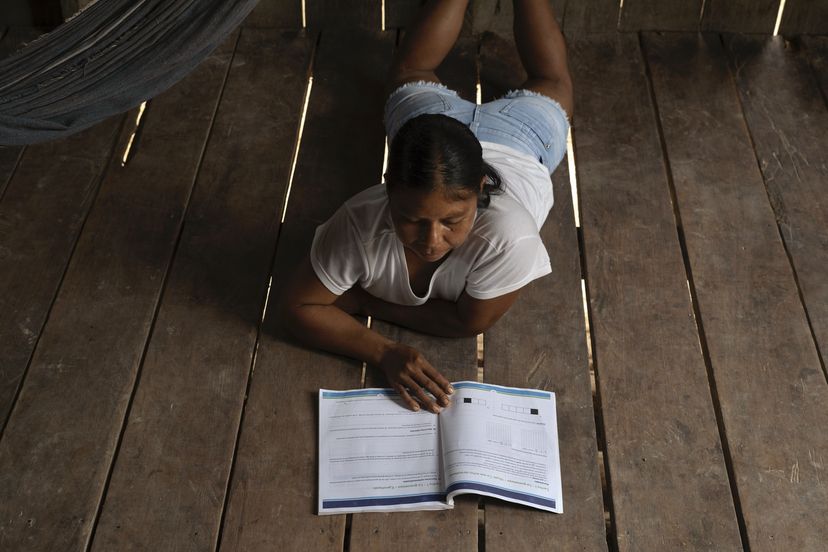In the heart of a hamlet located in Nazareth, among the thick vegetation of the Colombian Amazon, there is a tiny soccer field and a gray church where mass is celebrated in the afternoons. Sitting under the carana palm roof of a maloca, Clemencia Herrera Nemerayema, executive founder of the Corporación Cultural, Ecológica Mujer, Tejer y Saberes (Mutesa), an organization created in 2004 to empower the Indigenous Women of Colombia, victims of forced displacement and macho violence, and to promote training spaces and productive initiatives based on the knowledge and ancestral memory of the people, shelters from the relentless sun and humidity along with several women who follow her.
Since she left the ancestral territory of the Murui Muina people to settle in Bogotá, her presence in the Amazon communities is a beacon, a light that helps them survive in the depths of the Amazon jungle.
Through the FIMI-funded project “Strengthening productive entrepreneurship initiatives of indigenous women in Colombia,” Mutesa awarded the grant to 10 women's groups that lead grassroots organizations. This funding, which has been vital for them, aims to promote and strengthen innovative and high-impact ventures for the sustainable development of productive projects in their communities.
To achieve this, Mutesa created the Copoazú restaurant, which preserves the gastronomic memory of indigenous women displaced by the armed conflict and generates income from the recovery of local traditions and the sustainable use of Amazonian resources.
I wanted displaced women living in Bogota to have access to better living conditions, but without studies it was practically impossible until I built a space where they could learn some trades and finish their high school”, she says with her eyes fixed on some distant point of the Putumayo River.
Since then, Mutesa has provided scholarships to more than 1,500 women from all over the Colombian Amazon who decided to continue their studies and preserve their spiritual practices, specializing in health, education, political participation, climate change and extractivism, and through the FIMI-AYNI Women's Network, they have supported productive enterprises, ensuring that indigenous women continue to weave their history with autonomy and dignity.
If we strengthen their leadership within and outside the communities, we reduce economic gaps, promote gender equity and eliminate the violence and machismo that is so deeply rooted in many indigenous peoples,” explains Clemencia, a leader of the Uitoto people.
"Thanks to FIMI's support, the educational material reaches the heart of the territories, many of which are isolated in the most inaccessible corners of the jungle. We want no people to be excluded and all women to have access to education regardless of geographical or digital barriers," says the leader of the Uitoto people in the Colombian Amazon.
With more financial resources, the productive potential of these women could multiply, allowing them to expand their leadership, improve their quality of life and strengthen the economic autonomy of their families. Their wisdom, creativity and decision-making power are key to the social and economic transformation of their territories in the Colombian Amazon.
